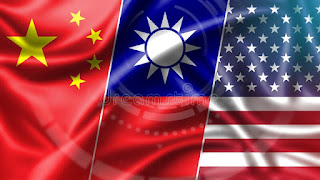Venezuela Condemns Pelosi Taiwan Trip, Reaffirms ‘One China’ Principle
Caracas, August 03, 2022 (venezuelanalysis.com) – The Venezuelan Foreign Ministry has condemned US House of Representatives Speaker Nancy Pelosi's two-day visit to Taiwan, calling it a "direct provocation” and a “serious threat” to China's “sovereignty and territorial integrity.”
In a statement issued on Tuesday, Caracas alerted the international community about Washington’s “acts of interference” and recalled that the 1971 United Nations resolution recognizes the People's Republic of China (PRC) “as the true and only legitimate representative of the Chinese people.”
“We reaffirmed our unrestricted adherence to the One China principle and the recognition of Taiwan as an inalienable part of China’s territory,” reads the communique, which highlighted Caracas and Beijing’s strong ties of friendship, cooperation and solidarity as well as their “strategic partnership,” launched in 2001 under the Hugo Chávez government.
On Tuesday, Venezuelan President Nicolás Maduro and Foreign Affairs Minister Carlos Faría likewise celebrated 48 years of diplomatic relations with China in two separate meetings with Cai Wei, the Chinese Foreign Ministry's director for Latin America and the Caribbean.
Beijing has been a crucial Venezuelan ally since the arrival of Hugo Chávez, providing development loans while also becoming one of Caracas’ most important trade partners. The Asian giant likewise offered key support in the fight against the Covid-19 pandemic. The Maduro government has recently looked to court Chinese investors to boost the country’s economic recovery, including in recently approved Special Economic Zones.
Pelosi and a congressional delegation landed in Taiwan's capital of Taipei on Tuesday and met with its leading officials amid a tour of Asian countries. The unannounced visit immediately sparked controversy, with Beijing denouncing “a serious violation of the One China principle and the provisions of the three China-US joint communiqués.”
“[The visit] seriously infringes upon China's sovereignty and territorial integrity. It gravely undermines peace and stability across the Taiwan Strait and sends a seriously wrong signal to the separatist forces in Taiwan,” condemned China's Ministry of Foreign Affairs in a long statement.
The Chinese government stressed that with Pelosi being a high-level authority in the Biden administration, “her visit to and activities in Taiwan, in whatever form and for whatever reason, is a major political provocation to upgrade US official exchanges with Taiwan.”
Following the House speaker's contentious trip, China’s Defense Ministry also announced it would conduct a series of “targeted military operations” around Taiwan to “defend national sovereignty and territorial integrity.”
Taiwan, which is roughly located 100 miles from the coast of southeast China, has been the cornerstone of a dispute between Beijing and Taipei’s US-backed separatist leaders. The political, diplomatic and military standoff dates back to the 1927-1949 Chinese civil war between nationalist government forces and Mao Zedong's People's Liberation Army, the military branch of the Chinese Communist Party (CCP).
After the communists won in 1949, Zedong founded the People's Republic of China (PRC), including Taiwan. However, the defeated nationalists fled to the island, renaming it the Republic of China (ROC) and turning it into their seat of government, leading to unsuccessful secessionist efforts.
Following Beijing's diplomatic efforts, on October 25, 1971, the United Nations General Assembly passed Resolution 2758 which recognized the People’s Republic of China as the only legitimate representative of China to the international community. Since then, 181 countries have established diplomatic relations with Beijing based on the One China principle.
With China quickly becoming a rising power, in 1979 the Jimmy Carter administration broke ties with Taipei to establish diplomatic relations with Beijing and acknowledged the Chinese position that Taiwan is part of mainland China. That same year, however, Washington also passed the “Taiwan Relations Act” to protect its commercial interests and sell arms to the breakaway island.
Although the White House has insisted that Washington’s position regarding the One China policy has not changed, in May President Joe Biden told the press that the US would defend Taiwan militarily in case of Chinese intervention. House Speaker Pelosi has now added fuel to the fire by disregarding Beijing’s protest over her visit which included a televised meeting with President Tsai Ing-wen.
“Our delegation came here to deliver an unequivocal message: America stands with Taiwan,” said Pelosi before leaving Taipei and heading to South Korea.
On Wednesday, Chinese State Councilor and Foreign Minister Wang Yi said Pelosi's Asian tour was a complete farce to cover for “heinous deeds of violating China's sovereignty under the guise of so-called democracy.”

